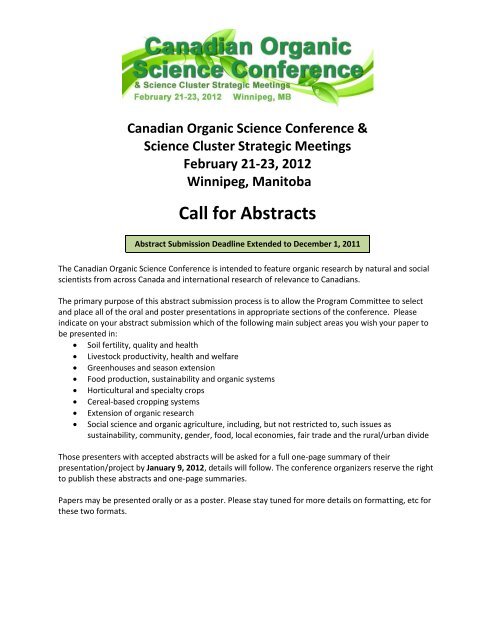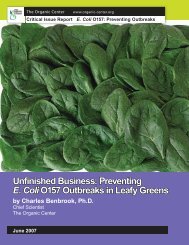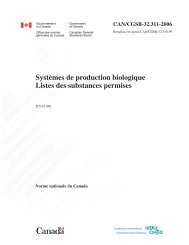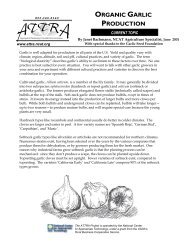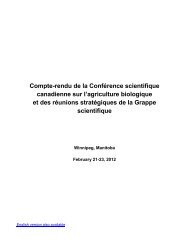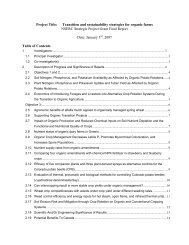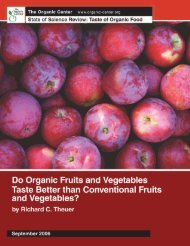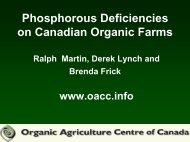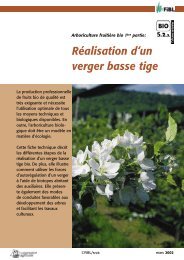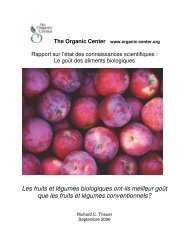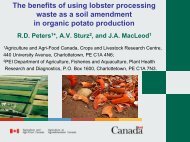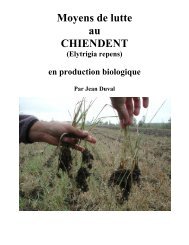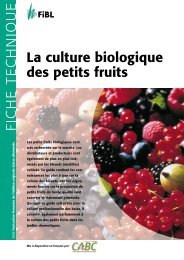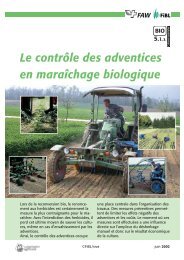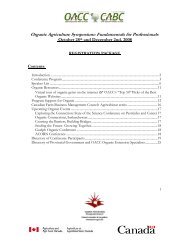a printable PDF document.
a printable PDF document.
a printable PDF document.
You also want an ePaper? Increase the reach of your titles
YUMPU automatically turns print PDFs into web optimized ePapers that Google loves.
Canadian Organic Science Conference &<br />
Science Cluster Strategic Meetings<br />
February 21-23, 2012<br />
Winnipeg, Manitoba<br />
Call for Abstracts<br />
Abstract Submission Deadline Extended to December 1, 2011<br />
The Canadian Organic Science Conference is intended to feature organic research by natural and social<br />
scientists from across Canada and international research of relevance to Canadians.<br />
The primary purpose of this abstract submission process is to allow the Program Committee to select<br />
and place all of the oral and poster presentations in appropriate sections of the conference. Please<br />
indicate on your abstract submission which of the following main subject areas you wish your paper to<br />
be presented in:<br />
• Soil fertility, quality and health<br />
• Livestock productivity, health and welfare<br />
• Greenhouses and season extension<br />
• Food production, sustainability and organic systems<br />
• Horticultural and specialty crops<br />
• Cereal-based cropping systems<br />
• Extension of organic research<br />
• Social science and organic agriculture, including, but not restricted to, such issues as<br />
sustainability, community, gender, food, local economies, fair trade and the rural/urban divide<br />
Those presenters with accepted abstracts will be asked for a full one-page summary of their<br />
presentation/project by January 9, 2012, details will follow. The conference organizers reserve the right<br />
to publish these abstracts and one-page summaries.<br />
Papers may be presented orally or as a poster. Please stay tuned for more details on formatting, etc for<br />
these two formats.
Deadline:<br />
Abstracts must be submitted by email by December 1, 2011 to Joanna MacKenzie<br />
(jmackenzie@nsac.ca). For those wishing to have earlier notification of their abstract's acceptance or<br />
decline, abstracts submitted by the original November 15, 2011 deadline will be reviewed by the<br />
beginning of December. Please indicate in your submission whether you wish to be considered for an<br />
oral or poster presentation. One-page summaries will also be due to Joanna MacKenzie by January 9,<br />
2012.<br />
Abstract Format:<br />
• The abstract is to be single spaced, left justified with 12 point Times New Roman font.<br />
• On the first line, please indicate whether you wish your paper to be considered for an oral or<br />
poster presentation.<br />
• On the second line, please indicate in which subject area you wish your paper to be considered<br />
(see the list above).<br />
• Please place the title in bold on the third line. Capitalize the first letter of all major words in the<br />
title and end the title with a period.<br />
• On the line below the title, please indicate the author(s) of the paper in the following format:<br />
o Initial(s) and Last name1, Initial(s) and Last name2, etc.<br />
o If more than one author, please identify the presenting author with an asterix (*)<br />
following their name.<br />
• On the next line, provide the address of each author with the identifying number supplied in the<br />
author information, as 1. Address; 2. Address, etc., also providing an e-mail address for the<br />
corresponding/presenting author.<br />
• Leave a single space between the author addresses and the abstract text.<br />
• Any scientific names are to be italicized and written in full, accompanied with the authority the<br />
first time they are mentioned. Cultivar names are to have single quotation marks around them.<br />
Abbreviations are to be spelled out the first time.<br />
• On the line following the end of the abstract text, please type the word “Keywords” and provide<br />
up to five keywords relevant to the presentation.<br />
• Please note that editing for typos, clarity or grammar will NOT be done by the compilers.<br />
Abstract Content:<br />
• The abstract should not exceed 350 words in length.<br />
• The abstract should be presented in a format that is easily understood across multiple<br />
disciplines and by audiences that may include scientists, extension specialists, agricultural<br />
professionals, students and farmers.<br />
• The abstract should include: an overview of the nature of the project that will be discussed; key<br />
objectives; expected or achieved conclusions and outcomes of the project; and the relevance of<br />
the project to organic agriculture in Canada. Results of projects may be included as appropriate.
Sample abstract:<br />
ORAL PRESENTATION<br />
Subject Area: Food Production, sustainability and organic systems<br />
Mainstreaming Organic Research: Canada's New Organic Science Cluster.<br />
A. M. Hammermeister1* and R. C. Martin2<br />
1. Organic Agriculture Centre of Canada, Truro, NS, ahammermeister@nsac.ca; 2. Department<br />
of Plant Agriculture, University of Guelph, Guelph, ON<br />
Organic research in Canada over the past few decades has been led by a relatively small group<br />
of researchers who’s dedication to finding ecological approaches to crop production has helped<br />
to build the credibility for the science and practice of organic agriculture. The fruit of these<br />
efforts has now been recognized with the development of Canada’s new Organic Science Cluster<br />
(OSC). Research priorities for this cluster were developed from consultation with farmers across<br />
Canada in all areas of organic production. The OSC has identified 10 sub-projects including 30<br />
research activities that will be conducted by over 50 researchers plus 30 collaborators in<br />
approximately 45 research institutions. The OSC is part of the Canadian Agri-Science Clusters<br />
Initiative of Agriculture and Agri-Food Canada's Growing Forward Policy Framework, with<br />
additional support from industry partners across Canada. Activities of the OSC will include work<br />
in fruit horticulture, agronomy, cereal crop breeding, soil fertility management, vegetable<br />
production, greenhouse production, dairy production systems, parasite control in ruminants,<br />
environmental sustainability, and food processing. This research comes at a time when there is<br />
renewed emphasis on innovation, efficiency (energy, labour, economics), and capturing valueadded<br />
markets. Most of this research directed toward organic agriculture can also be applied to<br />
conventional production systems, drawing interest to this cluster from producers across Canada.<br />
Here an overview of the OSC will be provided, with examples of linkages between organic and<br />
conventional.<br />
Keywords: organic, Canada, science


